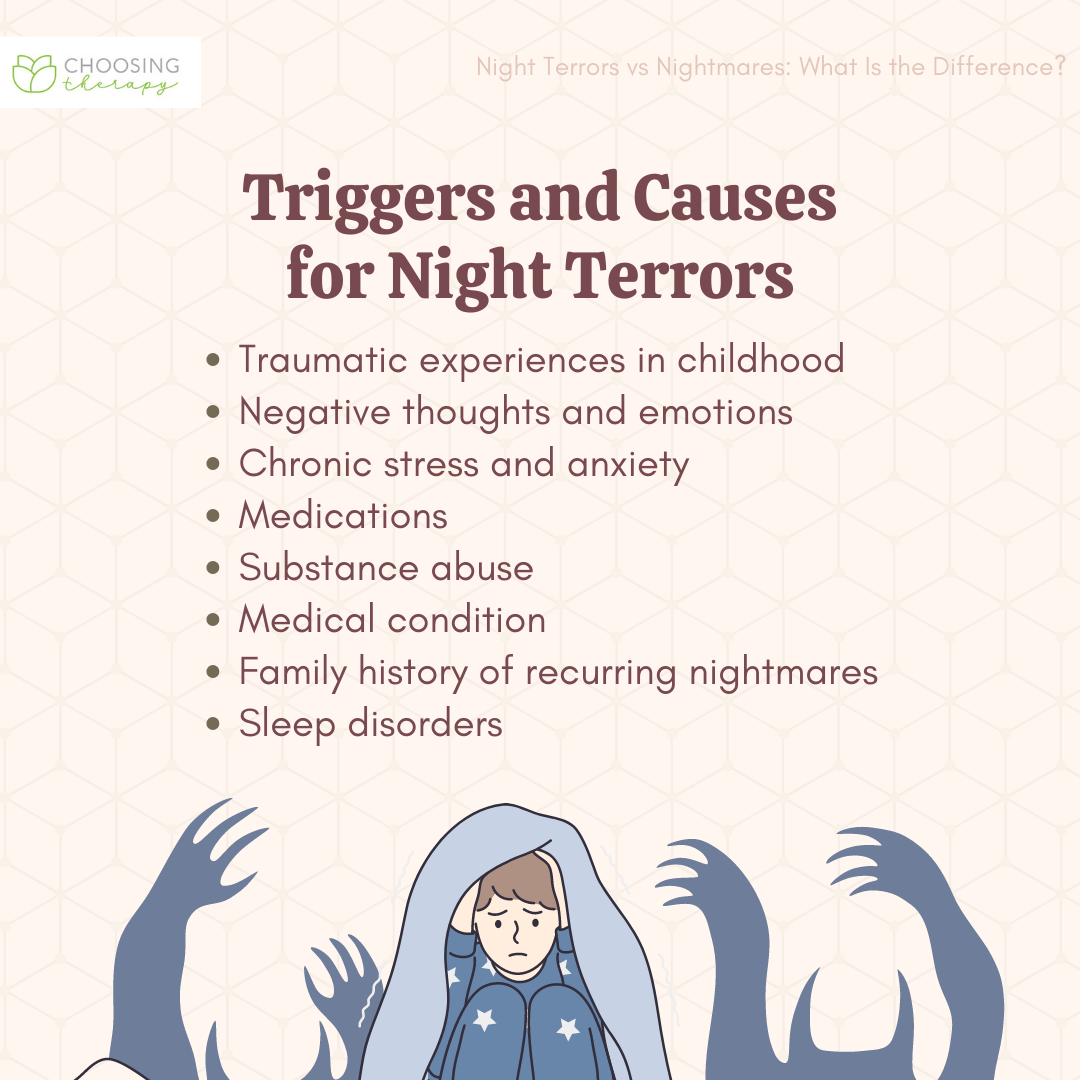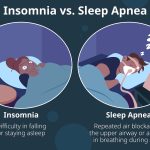Are you wondering if stress or anxiety can contribute to night terrors? Well, buckle up because we’re about to dive into this fascinating topic! Night terrors, those intense and terrifying episodes that happen during sleep, can leave us feeling shaken and confused. But could there be a connection between our emotional state and these haunting dreams? Let’s find out!
It’s no secret that stress and anxiety can wreak havoc on our minds and bodies. From sleepless nights to racing thoughts, these emotional burdens can take a toll on our well-being. But could they also be behind those spine-chilling night terrors that leave us drenched in sweat? It turns out, there might just be a link. So, if you’ve ever found yourself waking up in the middle of the night, heart pounding, and unable to shake off the lingering fear, keep reading because we’re about to uncover the secrets behind this mysterious phenomenon. Get ready to unravel the connection between stress, anxiety, and those bone-chilling night terrors!
**Can Stress or Anxiety Contribute to Night Terrors?**
Night terrors are a type of sleep disorder that can cause intense fear, panic, and confusion during sleep. These episodes typically occur during the first few hours of sleep and can last for several minutes. While night terrors are most commonly associated with children, adults can also experience them. It is believed that stress and anxiety can play a role in triggering night terrors, although the exact relationship between these factors is still not fully understood.
**The Connection Between Stress, Anxiety, and Night Terrors**
Stress and anxiety are known to disrupt sleep patterns and can contribute to various sleep disorders, including night terrors. When we experience stress or anxiety, our bodies release stress hormones such as adrenaline, which can increase our heart rate, blood pressure, and overall arousal levels. These physiological changes can disrupt the normal sleep cycle and lead to night terrors.
Additionally, stress and anxiety can contribute to the development of underlying mental health conditions, such as post-traumatic stress disorder (PTSD) or generalized anxiety disorder (GAD), which are known to be associated with an increased risk of night terrors. The presence of these conditions can further heighten the likelihood of experiencing night terrors.
**Managing Stress and Anxiety to Reduce Night Terrors**
While the exact relationship between stress, anxiety, and night terrors is complex, managing stress and anxiety can be beneficial in reducing the frequency and intensity of night terrors. Here are some strategies that may help:
**1. Stress Reduction Techniques:** Engaging in stress-reducing activities such as deep breathing exercises, meditation, yoga, or engaging in hobbies can help to alleviate stress and anxiety levels. These practices can promote relaxation and improve sleep quality, reducing the likelihood of experiencing night terrors.
**2. Establishing a Relaxing Bedtime Routine:** Creating a consistent bedtime routine that includes calming activities, such as reading a book or taking a warm bath, can signal to your body that it’s time to relax and prepare for sleep. This routine can help to ease stress and anxiety, promoting a more peaceful night’s sleep.
**3. Seeking Professional Help:** If stress and anxiety are significantly impacting your daily life and sleep patterns, it may be beneficial to seek professional help. A mental health professional can provide guidance and support in managing stress and anxiety, which may in turn reduce the occurrence of night terrors.
**4. Addressing Underlying Mental Health Conditions:** If you suspect that an underlying mental health condition, such as PTSD or GAD, is contributing to your night terrors, it is important to seek appropriate treatment. Working with a mental health professional can help to address the root causes of stress and anxiety, leading to improved overall well-being and potentially reducing the occurrence of night terrors.
**5. Creating a Restful Sleep Environment:** Ensuring that your sleep environment is conducive to quality sleep can also help in managing stress and anxiety. Keep your bedroom cool, dark, and quiet, and consider using relaxation techniques, such as white noise machines or calming music, to create a soothing atmosphere that promotes restful sleep.
In summary, while the relationship between stress, anxiety, and night terrors is complex, it is clear that managing stress and anxiety can have a positive impact on reducing the occurrence of night terrors. By implementing stress reduction techniques, establishing a relaxing bedtime routine, seeking professional help when needed, addressing underlying mental health conditions, and creating a restful sleep environment, individuals can take steps towards reducing the frequency and intensity of night terrors and improving overall sleep quality. Remember, it’s important to consult with a healthcare professional for personalized advice and guidance in managing stress, anxiety, and sleep disorders.
Key Takeaways: Can stress or anxiety contribute to night terrors?
- Stress and anxiety can potentially trigger night terrors in some individuals.
- Excessive worry and fear can disrupt sleep patterns and contribute to the occurrence of night terrors.
- Stress management techniques, such as relaxation exercises, may help reduce the frequency of night terrors.
- Seeking professional help, such as therapy or counseling, can be beneficial in managing stress and anxiety-related night terrors.
- Establishing a consistent bedtime routine and creating a calm sleep environment can also aid in minimizing night terrors associated with stress or anxiety.
Frequently Asked Questions
What is the relationship between stress or anxiety and night terrors?
Night terrors, also known as sleep terrors, are intense episodes of fear or terror that occur during sleep. They can cause individuals to wake up suddenly with a sense of panic, often accompanied by screaming or thrashing. While the exact cause of night terrors is not fully understood, stress and anxiety are believed to be contributing factors.
When we experience stress or anxiety during the day, it can carry over into our sleep. The body’s stress response system, which includes the release of stress hormones like cortisol, can become activated during sleep, leading to night terrors. Additionally, heightened emotional arousal and an overactive mind can make it difficult to transition into deep, restorative sleep, increasing the likelihood of experiencing night terrors.
How does stress impact the quality of sleep?
Stress has a significant impact on the quality of sleep. When we are stressed, our bodies release stress hormones that can interfere with the normal sleep cycle. This can lead to difficulty falling asleep, staying asleep, or achieving restful sleep. Stress can also cause racing thoughts and increased mental activity, making it harder to quiet the mind and relax into sleep.
Furthermore, stress can contribute to the development of sleep disorders, such as insomnia and night terrors. The constant activation of the body’s stress response system can disrupt the delicate balance of neurotransmitters and hormones involved in regulating sleep. As a result, individuals may experience more frequent and intense night terrors when they are under stress.
Can anxiety worsen the frequency and severity of night terrors?
Yes, anxiety can worsen the frequency and severity of night terrors. Anxiety is a state of heightened arousal and emotional distress, which can disrupt the normal sleep cycle and increase the likelihood of experiencing night terrors. The constant worry, racing thoughts, and physical symptoms associated with anxiety can make it difficult to relax and fall into deep, restorative sleep.
Additionally, anxiety can lead to hypervigilance, where individuals are constantly on alert for potential threats. This heightened state of arousal can make individuals more susceptible to night terrors, as their brains remain in a state of hyperarousal even during sleep. As a result, anxiety can exacerbate the frequency and severity of night terrors.
What are some strategies to reduce stress and anxiety for better sleep?
Reducing stress and anxiety can greatly improve the quality of sleep and reduce the occurrence of night terrors. Here are some strategies to help achieve better sleep:
1. Practice relaxation techniques: Deep breathing exercises, progressive muscle relaxation, and meditation can help calm the mind and promote relaxation before bed.
2. Establish a bedtime routine: Creating a consistent sleep routine can signal to the body that it’s time to wind down and prepare for sleep. This may include activities such as reading, taking a warm bath, or listening to soothing music.
3. Limit exposure to electronic devices: The blue light emitted by electronic devices can interfere with the production of melatonin, a hormone that regulates sleep. Avoid using electronic devices for at least an hour before bed to promote better sleep.
4. Create a comfortable sleep environment: Make sure your bedroom is cool, dark, and quiet. Invest in a comfortable mattress and pillow that support good sleep posture.
5. Seek support: If stress and anxiety are significantly impacting your sleep and overall well-being, consider seeking support from a therapist or counselor who can help you develop coping strategies and manage stress more effectively.
When should I seek professional help for night terrors related to stress or anxiety?
If night terrors related to stress or anxiety persist and significantly impact your quality of life, it may be beneficial to seek professional help. A healthcare provider or sleep specialist can evaluate your symptoms, provide a diagnosis, and recommend appropriate treatment options. They may suggest therapy, stress management techniques, or medication to help alleviate the impact of stress and anxiety on your sleep and reduce the occurrence of night terrors.
Night terrors vs. nightmares #shorts
Final Thoughts
It’s clear that stress and anxiety can have a significant impact on our sleep, but can they also contribute to night terrors? After diving into the research and exploring this topic, the answer seems to be a resounding yes. While night terrors are primarily associated with children, adults can also experience them, especially when dealing with heightened levels of stress or anxiety.
The connection between stress, anxiety, and night terrors lies in the way our brains process and respond to these emotions. When we’re under stress or feeling anxious, our brain’s sleep patterns can become disrupted, leading to an increased likelihood of experiencing night terrors. Additionally, these intense emotions can trigger the release of certain chemicals in our brain that can further disrupt our sleep and contribute to the occurrence of night terrors.
So, if you find yourself struggling with night terrors, it’s important to address any underlying stress or anxiety that may be contributing to them. Seeking support from a mental health professional can help you develop coping mechanisms and strategies to manage these emotions, ultimately leading to improved sleep quality and a reduction in night terrors.
Remember, taking care of your mental well-being is just as important as taking care of your physical health. By prioritizing stress reduction and managing anxiety, you can create a more peaceful and restful sleep environment for yourself, minimizing the occurrence of night terrors. Sweet dreams!




